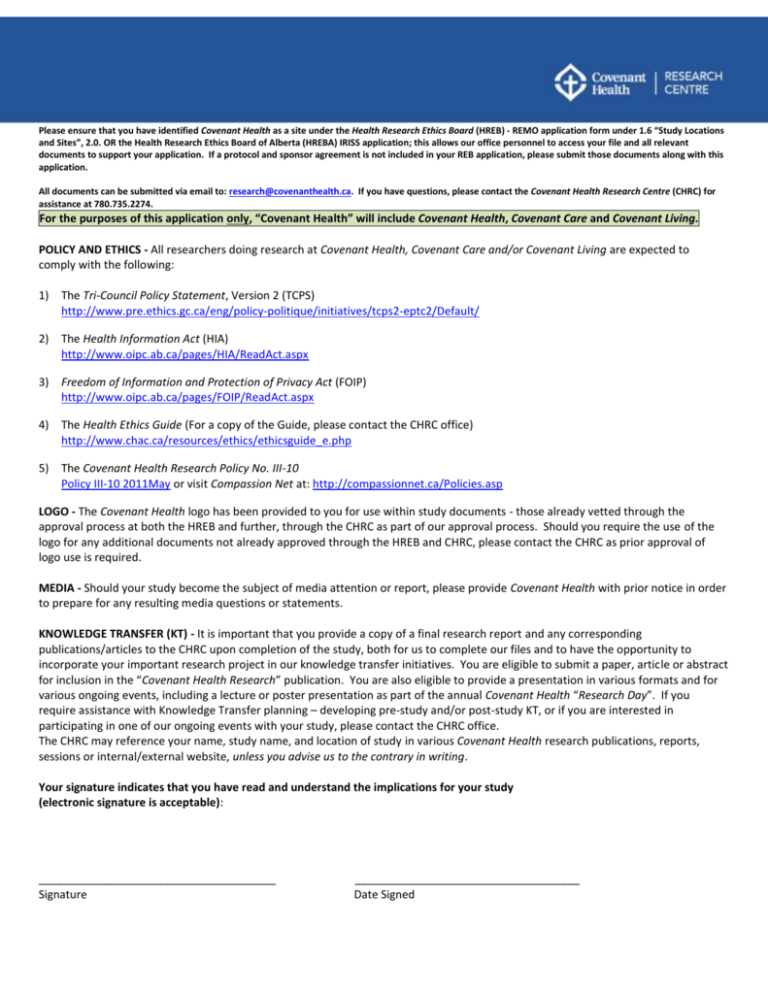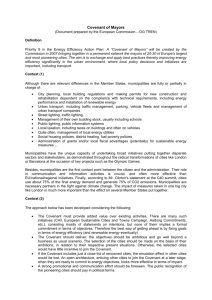Covenant Health Application Form
advertisement

Please ensure that you have identified Covenant Health as a site under the Health Research Ethics Board (HREB) - REMO application form under 1.6 “Study Locations and Sites”, 2.0. OR the Health Research Ethics Board of Alberta (HREBA) IRISS application; this allows our office personnel to access your file and all relevant documents to support your application. If a protocol and sponsor agreement is not included in your REB application, please submit those documents along with this application. All documents can be submitted via email to: research@covenanthealth.ca. If you have questions, please contact the Covenant Health Research Centre (CHRC) for assistance at 780.735.2274. For the purposes of this application only, “Covenant Health” will include Covenant Health, Covenant Care and Covenant Living. POLICY AND ETHICS - All researchers doing research at Covenant Health, Covenant Care and/or Covenant Living are expected to comply with the following: 1) The Tri-Council Policy Statement, Version 2 (TCPS) http://www.pre.ethics.gc.ca/eng/policy-politique/initiatives/tcps2-eptc2/Default/ 2) The Health Information Act (HIA) http://www.oipc.ab.ca/pages/HIA/ReadAct.aspx 3) Freedom of Information and Protection of Privacy Act (FOIP) http://www.oipc.ab.ca/pages/FOIP/ReadAct.aspx 4) The Health Ethics Guide (For a copy of the Guide, please contact the CHRC office) http://www.chac.ca/resources/ethics/ethicsguide_e.php 5) The Covenant Health Research Policy No. III-10 Policy III-10 2011May or visit Compassion Net at: http://compassionnet.ca/Policies.asp LOGO - The Covenant Health logo has been provided to you for use within study documents - those already vetted through the approval process at both the HREB and further, through the CHRC as part of our approval process. Should you require the use of the logo for any additional documents not already approved through the HREB and CHRC, please contact the CHRC as prior approval of logo use is required. MEDIA - Should your study become the subject of media attention or report, please provide Covenant Health with prior notice in order to prepare for any resulting media questions or statements. KNOWLEDGE TRANSFER (KT) - It is important that you provide a copy of a final research report and any corresponding publications/articles to the CHRC upon completion of the study, both for us to complete our files and to have the opportunity to incorporate your important research project in our knowledge transfer initiatives. You are eligible to submit a paper, article or abstract for inclusion in the “Covenant Health Research” publication. You are also eligible to provide a presentation in various formats and for various ongoing events, including a lecture or poster presentation as part of the annual Covenant Health “Research Day”. If you require assistance with Knowledge Transfer planning – developing pre-study and/or post-study KT, or if you are interested in participating in one of our ongoing events with your study, please contact the CHRC office. The CHRC may reference your name, study name, and location of study in various Covenant Health research publications, reports, sessions or internal/external website, unless you advise us to the contrary in writing. Your signature indicates that you have read and understand the implications for your study (electronic signature is acceptable): ______________________________________ Signature ____________________________________ Date Signed 1. Full Long Title of Study: 2. Study reviewed by: Conjoint Health Research Ethics Board (CHREB); Health Research Ethics Board (HREB); Health Research Ethics Board of Alberta (HREBA); 3. Name of Principal Investigator: Mailing Address: 4. Specify Research Coordinator and/or Research Assistant(s) who will be involved with this study: Phone Number: Fax Number: Email: Name: Mailing Address: 5. Phone Number: Fax Number: Email: Locations participating in the study: (For a listing of patient populations served within each location, please reference http://www.covenanthealth.ca/facilities.html) Banff: Mineral Springs Hospital (MSH) Beaumont: Chateau Vitaline (CV) – Covenant Care facility Bonnyville: Bonnyville Health Centre (BHC) Calgary: Holy Cross Manor (HCM) – Covenant Care facility St. Marguerite Manor (SMM) – Covenant Care facility Camrose: St. Mary’s Hospital (SMH) Castor: Our Lady of the Rosary Hospital (OLRH) Edmonton: Edmonton General Continuing Care Centre (EGCCC) Grey Nuns Community Hospital (GNCH) Misericordia Community Hospital (MCH) Villa Caritas (VC) St. Joseph’s Auxiliary Hospital (SJAH) Centre de santé St-Thomas (CSST) – Covenant Care facility 6. Killam: Killam Health Centre (KHC) Lethbridge: St. Michael’s Health Centre (SMHC) St. Therese Villa (STV) Martha’s House (MH) – Covenant Living facility Medicine Hat: St. Joseph’s Home for the Aged (SJHA) Mundare: Mary Immaculate Hospital (MIH) Red Deer: Villa Marie (VM) – Covenant Care facility St. Albert: Youville Home (YH) Trochu: St. Mary’s Health Care Centre (SMHCC) Vegreville: St. Joseph’s General Hospital (SJGH) Alberta Health Services (AHS) Locations: List all departments/units that will be impacted by the study and how they will be impacted (i.e. Health Records – charts pulled…; Family Medicine Clinic – patients recruited…; ) Depts/impact: Lab - | Pharmacy - | - Diagnostic Imaging | - 7. Estimated duration of project: 8. List all databases you will be using as part of your research study: | Start Date: If Chart Review: Who will be reviewing the charts (name & phone number if other than P.I.): - | plus - | - Completion Date: Please note that you cannot recruit patients from these systems without use of an intermediary. Separate database agreements may also be required. A navigator will advise you accordingly. 9. Ethics board study # (i.e. Pro00001234): Netcare eClinician Other (specify) Number of charts to be reviewed: Diagnoses or Procedures: Time period for patient chart review: From Date to Pax 10. For Database purposes, please complete the following sections by indicating the appropriate elements that best represent your study. Chart Review - A retrospective method of collecting data that involves Type of study: (mark at least one from each reviewing medical records column, and all that apply) Sequel (study#) Clinical Trial - Any investigation in human subjects intended to discover or verify the clinical, pharmacological, and/or other pharmaco-dynamic effects of an investigational Interventional Research - Any research product, and/or to identify any adverse reactions to an investigational product(s), and/or project that prospectively assigns human subjects study absorption, distribution, metabolism, and excretion of an investigational product(s) to intervention and comparison groups to study the with the object of ascertaining its safety and/or efficacy. The terms clinical trial and clinical cause-and-effect relationship between a medical study are synonymous intervention and a health outcome. Epidemiological Study - A study of the patterns of determinants and antecedents of Observational Research - A type of study in disease in human populations utilizing biology, clinical medicine, and statistics in an effort to which individuals are observed or certain outcomes understand the etiology (causes) of illness and/or disease. are measured. No attempt is made to affect the outcome (for example, no treatment is given). Multi-centre Trial - A single trial conducted according to a single protocol but at more than one site Excerpt from HREB Guideline document: “In a clinical context, it is sometimes difficult to determine which data-collection projects need research ethics review. Ordinarily, quality improvement projects do not require review. Use the following questions as a guide to decide whether your project must be submitted for research ethics review: *Is your project designed to test a specific hypothesis or answer a specific research question? *Will the information be collected by someone who does not normally have access to clinical records or patient names? *Are you comparing different groups or treatments methods, or is there random assignment to groups? *Do you want to present the results at a conference or in written form as research findings? If you are unsure whether or not your project should be reviewed, contact the HREB office at: (780) 492.0459 Pilot Study - a small scale preliminary study conducted before the main research, in order to check the feasibility or to improve the design of the research. Qualitative Study - Investigative methodologies described as ethnographic, naturalistic, anthropological, field, or participant observer research. It emphasizes the importance of looking at variables in the natural setting in which they are found. This differs from quantitative research which attempts to gather data by objective methods to provide information about relations, comparisons, and predictions and attempts to remove the investigator from the investigation. Technology Assessment/Development - Technology assessment is hereby defined as any clinical research studying or evaluating new technologies (for example; medical equipment, biologic specimen/sample or testing with no direct patient contact). Biologic specimens and samples are/can be obtained from human subjects. Other (specify) 11. Indicate the research context for your research: Urban Rural All 12. Indicate the research focus from a strategic perspective: Capacity Building Professional Practice Patient-centered Systems-centered Prevention Innovation Sub-acute Palliative CC or DAL or AL Rehab 13. Indicate the Covenant Health service area: Acute Community Service (respite) 14. Indicate the appropriate Therapeutic Department and corresponding Section: Department*: Addictions and Mental Health Anesthesia Cardiac Sciences Section*: Psychiatry (Child) Other, specify Psychiatry (Adult) Psychiatry (Geriatric) Anesthesia Cardiology/Vascular Diseases – Diseases having to do with the structure and function of the heart and blood vessels. Studies in these areas include: heart failure, coronary artery disease, high cholesterol, blood clots, circulation disorders, and others* Child Health Pediatrics Dental/Oral Health Dental & Oral Health Devices Cardiology Speech Pathology & Audiology Diagnostic Imaging Radiology Diagnostic Nuclear Medicine Family Health Family Practice Patient-centered Health Team (PCHT) Endocrinology & Metabolism Palliative Care (Family Health) Obstetrics & Gynecology Anesthesia Geriatrics Geriatrics (Family Health) Geriatric Medicine ICU Critical Care Medicine Laboratory Pathology, General Pathology, Anatomical Laboratory Medicine General Medicine Infectious Diseases Nephrology/Urology – The studies and the Internal Medicine Neurology Endocrinology & Metabolism – Field relating to treatment of diseases of the kidney and the urinary tract. Studies in these areas include: bladder cancer, impotence, kidney disease, kidney stones, mastectomy, nocturia, renal cell carcinoma, urinary tract infections, and others* Respiratory/Pulmonary Clinical Immunology & Allergy Neonatal-Perinatal Medicine hormone-manufacturing glands such as the pituitary, thyroid, parathyroid, and adrenal glands, as well as the ovary and testis, the placenta, and the pancreas. Studies in this area include: diabetes and diabetes-related disorders, diet and nutrition, hormone-replacement therapy, menopause, obesity, and others* Other, specify Emergency Medicine Family Practice with Obstetrics Infectious Diseases Hematopathology Gastroenterology – The study of gastrointestinal organs and diseases relating to them. This includes any part of the digestive tract from mouth to anus, liver, biliary tract, and the pancreas. Studies in this area include: constipation, Crohn’s diseases, diarrhea, gall bladder disease, heartburn, hemorrhoids, irritable Bowel Syndrome (IBS), ulcers, liver disease, stomach cancer, and others* Rheumatology Physical Medicine & Rehab Palliative Care Palliative Care Podiatry Podiatry Practice Physicians Other, specify Nursing Allied Health Surgery Urology Otolaryngology – Also known as ENT (ears, nose, Surgery, General Maxillofacial Prosthodontics (Dent.) Surgery, Plastic – Fields concerned with skin Surgery, Vascular Surgery, Orthopedic Obstetrics & Gynecology and throat); this is the study of diseases involving the ears and the larynx. Studies in this area include: allergy, ear infections, pneumonia, rhinitis, sinus infections, strep throat, and others* Oral & Maxillofacial (Dent.) – Surgery relating to the teeth, jaw, face and its structures. Studies in these areas include: acute and chronic dental pain, oral cavity cancer, oral facial pain, oral medicine, and saliva and salivary gland dysfunction* Genetics disorders and reconstruction or replacement of deformed, damaged, or lost parts of the body. Also concerns cosmetic surgery. Studies in these areas include: acne, congenital skin diseases, genital herpes, genital warts, liposuction, psoriasis, skin wounds, athlete’s foot, venous leg ulcers, and others* Podiatry Women’s Health Obstetrics & Gynecology – Research pertaining to the care of women during pregnancy and childbirth, as well as to the study of the women’s reproductive system in general. Studies in these areas include: contraception, hormone-replacement therapy, menopause, menstrual disorders, ovarian cysts, PMS, pregnancy/labor/delivery, yeast infections, and other*. Urogynecology *Definitions obtained from CentreWatch 15. For Database Purposes - Multi-disciplinary Teams (please list all disciplines participating as part of your study team, i.e. nursing, respiratory therapy, etc.) 16. Please indicate which strategic directions your study impacts at Covenant Health (check all that apply) SERVE: Strengthen our mission and live our values to meet the needs of those we serve through excellence in care, an engaged team and wise use of our resources. S1 Attract, engage, develop S2 Provide excellence in and retain Mission driven care and service by exceeding employees, physicians and performance expectations in volunteers and support them in quality and safety. discovering and deepening their own call. S3 Utilize and enhance our information, infrastructure and financial resources to their fullest capacity GROW: Seek out and respond to the needs of our communities, especially vulnerable and marginalized populations. G1 Expand service and capacity in acute care to respond to a growing population and changing demographics. G2 Expand our capacity to care for seniors and those with addiction and mental illness. G3 Expand into community care to address gaps in service delivery. C2 Partner with patients, residents, families, communities and key contributors to achieve health and healing. C3 Leverage the legacy and strength of Catholic health care in order to be of better service to Albertans. CONTRIBUTE: Leverage C1 Give voice to those who our legacy to maximize are vulnerable or voiceless the strategic through public engagement contribution of Catholic and advocacy. health care. C4 Deepen the understanding of the strategic contribution of Catholic health care in Alberta and across Canada. TRANSFORM: Create systems of care that enable people and communities to be healthy. T1 Design, implement and share high performing systems of care and service based on integration, innovation and evidence. T4 Be leaders in robust palliative and end of life care and advocate for it as an essential part of the health system. T2 Enable seniors to live to T3 Create opportunities the fullness of their capacity as to enable those with active and connected members addiction and mental illness of their communities. to live and participate in community with dignity and hope.









